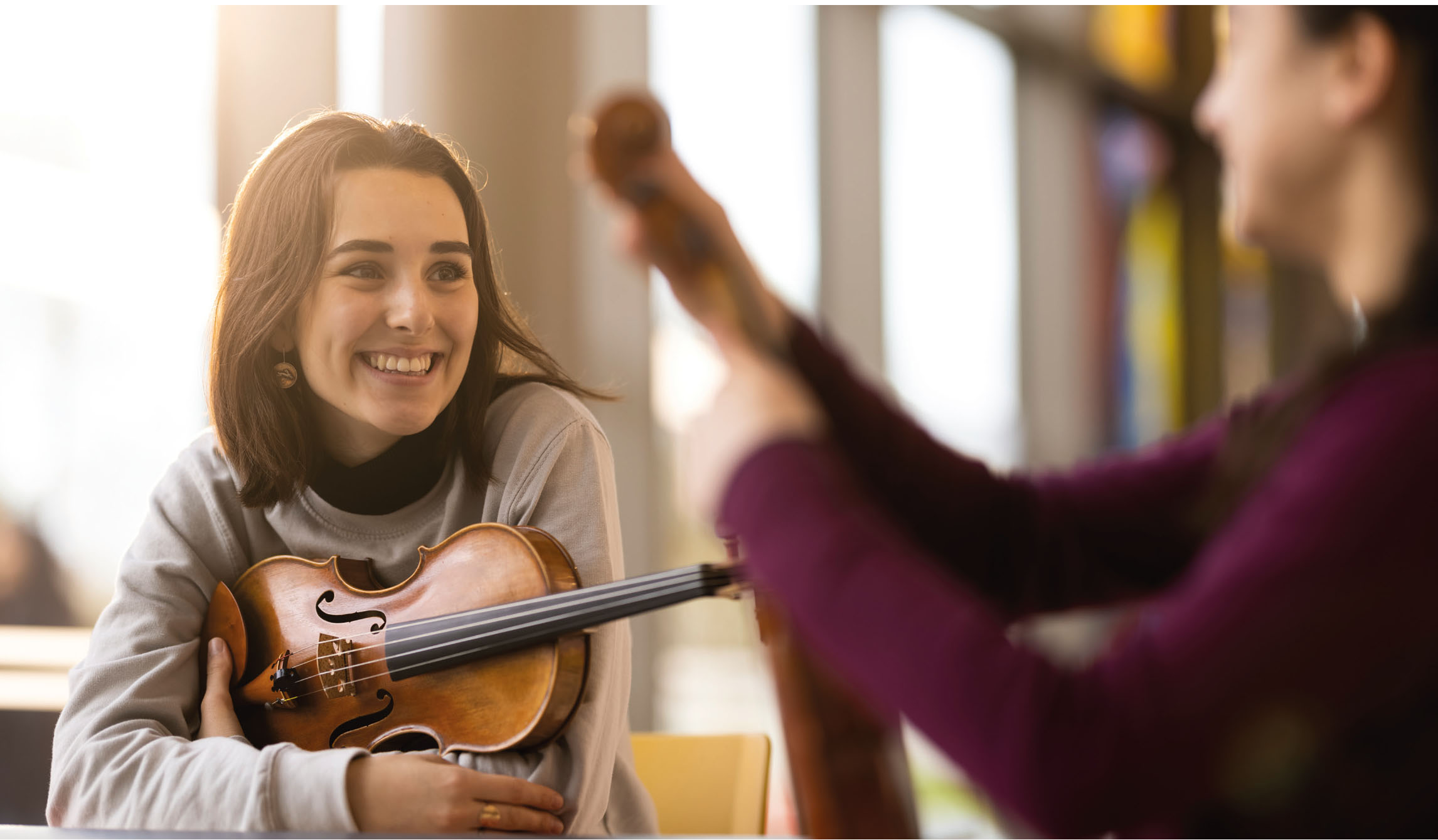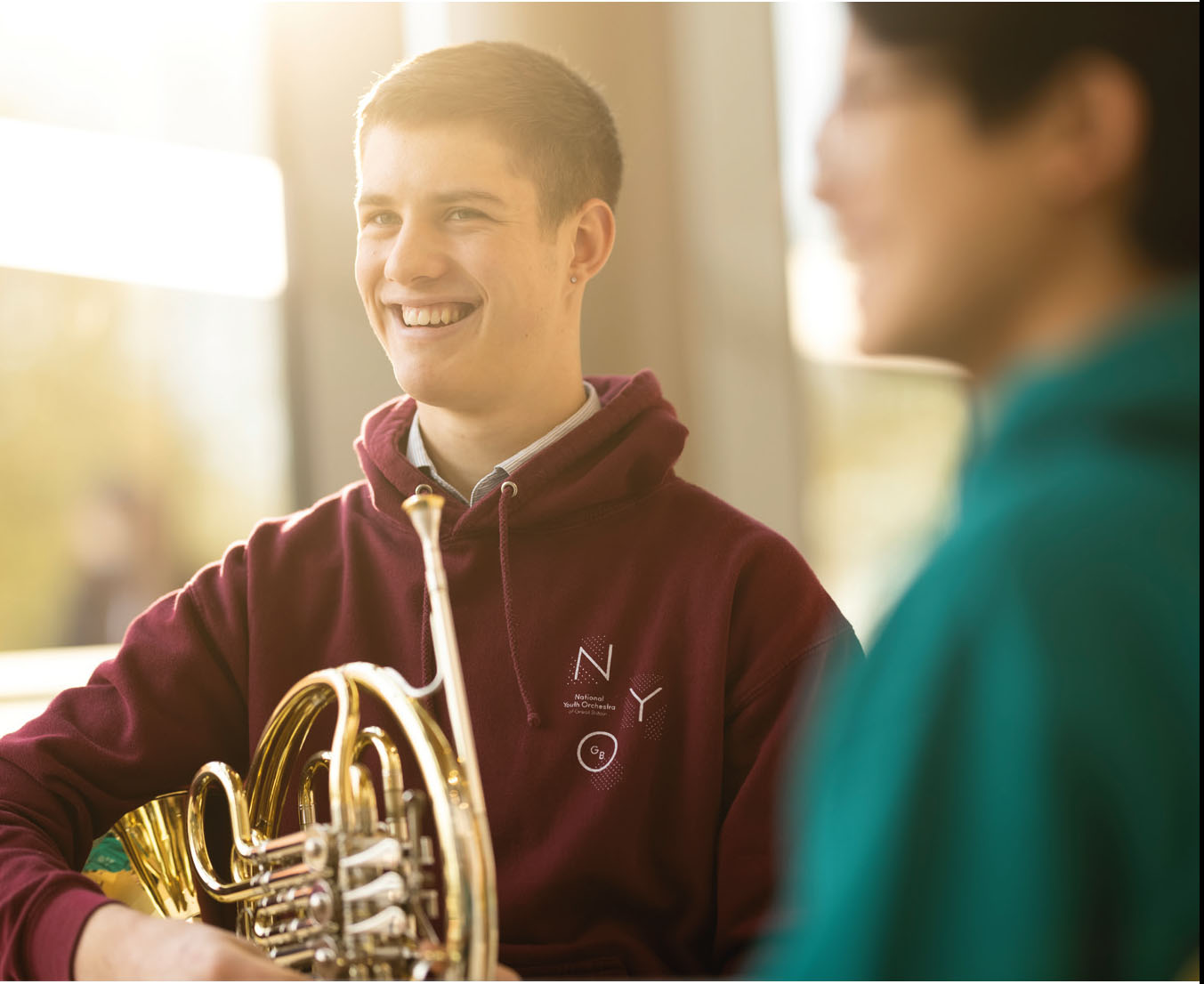
There's a point around the Easter bank holiday that the dreams return. I'm sat in an examination hall, trying to scribble down my answers to an unknown paper. But building work is going on outside and I can't concentrate. My essay-writing is stilted; fluidity evades me. I'm going to fail the exam. It's the end of the world. I wake, clammy and confused. I haven't taken any sort of academic assessment for nearly two decades – yet every year, just before the summer term commences, I am temporarily gripped with anxiety.
The word ‘Kettering’ has a similar effect: the Northamptonshire town is indelibly marked as the location of my failed audition into the National Youth Orchestra of Great Britain (NYO), and forever associated with shame and disappointment. But while many students must still contend with a school system that revolves around high-stakes qualifications, many of the hierarchical processes at NYO have been dismantled – prospective members can expect a much more enjoyable journey.
‘We know that people's experience of NYO is ingrained into their music education. It's something we take very seriously,’ says Sarah Alexander, NYO's chief executive and artistic director. Auditions are now far more accessible and transparent. Musicians need to be at Grade 8-plus standard, but no longer need to have taken the exam, and bursaries are readily available. ‘We like to see the people involved in the process as gate openers, rather than gate keepers,’ explains Alexander.
Diversifying the talent pipeline
NYO is no longer ‘just’ the famous ensemble: the organisation also comprises NYO Inspire and NYO Open, expanding activity from that which directly benefitted 164 young musicians to projects that reach thousands. Both initiatives have been conceived to support broader participation and create a more diverse talent pipeline into NYO. NYO Inspire was created specifically for teenagers who attend state schools, are home educated, and/or are Black, Asian or ethnically diverse – communities underrepresented in the world of orchestral music. The proof is in the pudding: 47 per cent of the orchestra are NYO Inspire alumni and NYO has increased its intake of state-educated musicians from 30 per cent in 2008 to 53 per cent in 2019.
One such student is Thomas Judge, who is officially a double bass player but will ‘take on any instrument’, including an ancient baritone saxophone discovered in the back of the music cupboard. When we speak, Judge is preparing for NYO's big date of the summer: the annual performance at the BBC Proms (6 August). The high-profile concerts are regularly of an extremely high standard – in 2016, the Telegraph described that year's Prom as ‘a brilliantly robust defence of [NYO's] part in our cultural fabric’.
Being part of NYO isn't just about starry nights at the Royal Albert Hall, though. ‘For me, the big performances and residencies are amazing – but the ongoing personal development is just as important,’ says Judge. Both Judge and Connie Hayward, a viola player and guitarist, speak enthusiastically about their experiences working within schools with NYO. ‘The concerts are fantastic – it really felt like there wasn't a division between musician and audience,’ she says. ‘It was as though there was a ball of music,’ adds Judge.
‘It's so important for musicians to share music with peers,’ explains Alexander, ‘Years ago, youth orchestra leaders would have wanted to “do” Mozart really well. Today, it's more about making an ensemble the best it can be – and that's not just about technical musical ability.’
 Credit: Jason Alden
Credit: Jason Alden
Rebelling against form
NYO has always been a popular and aspirational ensemble for teenage musicians. When, in 1947, Ruth Railton placed posters in music shops to advertise a new national orchestra for young people, she was inundated with responses. Over 2,000 people expressed an interest in the new venture. The successful 110 participants gathered the following year for a 10-day residency culminating in their first performance. Over the decades, NYO worked with leading lights within the music world, including Britten, Charles Groves and Colin Davis, and the ensemble's reputation blossomed.
Now, Alexander wants to consolidate those achievements – and take NYO into the future. ‘A unifying strand of our overall strategy is the diversification of the symphony orchestra. You can't diversify who is in your orchestra if you don't embrace the full range of instruments,’ says Alexander. ‘Why should our orchestra be fixed in the form it found in the 19th-century? Obviously, you can't add saxophones, electric guitars and steel drums overnight, but we can certainly begin to create new music. In all of our decision making, we consider what a 21st-century teenage ensemble should be modelling to young people.’
This could be witnessed at NYO's recent Royal Festival Hall concert Open Up: Running Riot!, a programme centred around Stravinsky's The Rite of Spring that drew on that composer's rebellious spirit. It featured Dinuk Wijeratne's Tabla Concerto (with Sandeep Das as the soloist) and Téenek by Gabriela Ortiz, two pieces that fuse classical heritage with cross-genre elements. ‘Working with Sandeep Das was lightyears away from what I thought I'd be doing with NYO,’ grins Judge, who clearly relished every moment working with the tabla player. As part of the ensemble's commitment to playing to peers, tickets to the London concert were free for under-19s and there was a repeated performance at Saffron Hall, exclusively for a teenage audience.
 Credit: Jason Alden
Credit: Jason Alden
Celebrating elite musicians
Alexander, who has been at the helm of NYO for over 10 years and was appointed OBE in 2018, was part of the advisory panel that informed the recently revealed National Plan for Music Education (NPME). ‘Everything that happens in the sector matters to NYO and vice versa to some extent,’ she says, on the topic of her involvement. ‘So much leadership comes from NYO – that's not just about Thomas Adès, Simon Rattle, Judith Weir and Mark Elder; it's about teachers and musicians around the country.’
There are lots of positive elements to the latest iteration of the NPME, as well as some omissions (discussed previously in MT). The NPME's vision is ‘to enable all children and young people to learn to sing, play an instrument and create music together, and have the opportunity to progress their musical interests and talents, including professionally’, ‘building on the 2011 vision, responding to the change of the past 11 years, and recognising that more needs to be done to support teachers, leaders, schools, trusts and music hubs to deliver the best for children and young people.’ What does Alexander make of the final 83-page document? ‘The particular difference between this plan and the previous one is the role of schools and hubs. Schools have been through such a difficult time with all the changes in curriculum, plus Covid – they need better support. There does at least seem to be an understanding that for young people to have music in their lives it needs to begin at school. Starting from the point of view that every child is musical is fundamental.’
As always, there are caveats. The NPME is advisory and has its limitations. ‘We'd all love to have more accountability,’ considers Alexander. Working on the Plan has strengthened her belief that she wants NYO to continue – and advance – its work as a top-down organisation, ‘cascading the good stuff’. ‘We're not alone in thinking this way,’ she says, ‘plenty of organisations are passionate about it.’
One aspect of the NPME that did have personal significance for Alexander and NYO was that as well as highlighting the importance of high-quality curricular and co-curricular music, chapter three contains reassurance for advanced levels of music making: ‘This country has a rich history of musical excellence, supported not only by government, but by industry, philanthropy, and the generosity of communities up and down the country raising funds to support music. We should be proud of creating elite musicians, just as we cheer on our sporting elite. Musical talent should be cherished and celebrated, and young people should be supported to find and benefit from opportunities up to the highest level.’
‘It is a relief to see that enshrined in writing,’ says Alexander. ‘People get hot under the collar about the world “elite”: we have to be proud of music making at all stages.’ With initiatives like NYO Inspire and NYO Open, it's becoming easier for young musicians to be part of the ‘elite’ NYO world, no matter what their background. ‘Our model focuses on starting points for musical excellence,’ says Alexander. There is hope that the next generation of musicians will sleep more easily.








